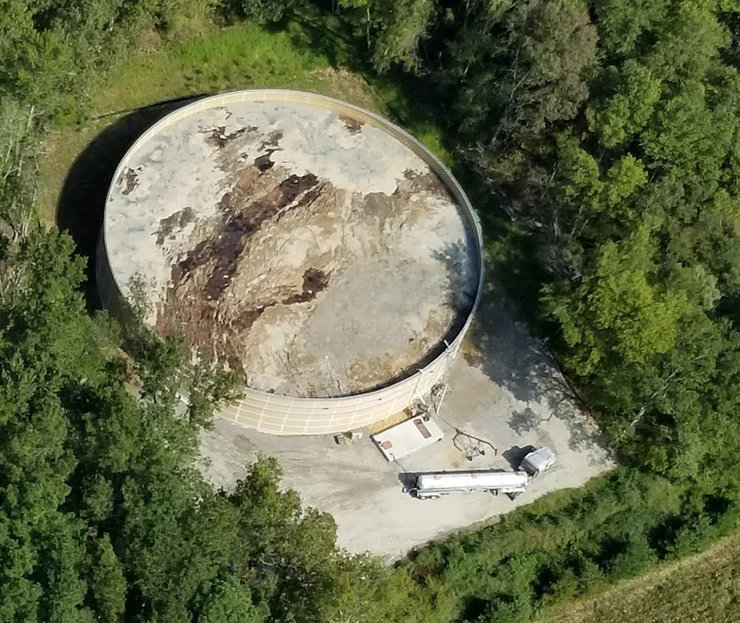Wicomico seems headed for ban on slurry storage tanks
Wicomico County Council members voted last week to advance an outright ban on dissolved air flotation – DAF – storage tanks, the latest push in a more than three-year-long debate over the construction and placement of the controversial sludge tanks across the county.

You must be a member to read this story.
Join our family of readers for as little as $5 per month and support local, unbiased journalism.
Already a member? Log in to continue. Otherwise, follow the link below to join.
Please log in to continue |
Wicomico seems headed for ban on slurry storage tanks
Wicomico County Council members voted last week to advance an outright ban on dissolved air flotation – DAF – storage tanks, the latest push in a more than three-year-long debate over the construction and placement of the controversial sludge tanks across the county.
Of the three bills proposed at legislative session to prohibit DAF storage tanks, Legislative Bill 2022-10 passed in a 5-2 vote opposed by Council President John Cannon and Councilman Joe Holloway.
Legislative Bill 2022-10 calls for an outright ban on open-top storage of liquid organic fertilizer or soil amendments in all zoning districts across the county. The other two bills proposed on Tuesday – one to allow DAF storage tanks only in industrially zoned districts and another to allow tanks only in agriculturally zoned districts – both failed to be brought forward for a vote.
After council members discussed at length the potential zoning areas where DAF tanks could be limited to, or banned outright, Councilman Bill McCain expressed his stance that there may not be any suitable location for the tanks within the county.
“Wicomico County is a terrible county to have DAF tanks,” he said. “We have a tremendous amount of tidal wetlands, nontidal wetlands and stream buffers. The impact anywhere you try to put one (tank), you’re trying to deal with these issues, it’s simply that Wicomico is not a good candidate.”
The debate over DAF storage tanks began in 2019 after the county approved the construction of a 3 million gallon, open-air storage tank on Porter Mill Road – to the disdain of many neighboring residents who complained of a distinguishably foul smell that lingered near the tanks.
Soon after, the council placed a moratorium on the construction of all new DAF tanks, and extended that moratorium in April of this year, but the moratorium did not impact pre-approved construction projects, such as in the instance of Porter Mill Road.
“This issue started when I first got on the council three and a half years ago, and here we are at the end of my term, and we still don’t have a resolution,” Councilwoman Nicole Acle said during the legislative session. “Whatever direction we take, I would like to see us move forward with something tonight.”
Cannon spoke on his concerns about the legality of enforcing an outright ban on DAF tanks in all zoning districts, while adding that it may be more legally defensible to limit the tanks strictly to agricultural zones.
“I’m concerned that banning the DAF tanks is pretty much considered legally indefensible,” Cannon said. “Poultry and agriculture is the industry of Wicomico County and the Eastern Shore. We’re looking for a compromise, maybe not a 100 percent solution, but some type of compromise that isolates them (the DAF storage tanks) and keeps them out of the neighborhoods.”
The legality of banning all DAF tanks across the county has come into question given the state’s right to farm laws, which states agricultural operations that have been underway for at least a year and follow all federal, state and local guidelines cannot be considered a private or public nuisance, according to the Maryland Department of Agriculture.
Holloway also expressed his apprehension toward a county-wide ban given the potential harm it may bring to local poultry businesses and farmers.
“We understand why folks are upset because of the odor, they’re not happy about it being there, but we’ve experienced the environmental community going after the poultry business (in the past), and that’s the fear we have right now,” Holloway said. “If we ban these tanks – and we do need to restrict them some and set buffers – but the fear in this room right now amongst the poultry companies and growers is that they’re next.”
The bill is scheduled for a public hearing on Oct. 4, and council members will have 60 days to vote on the legislation after its introduction last week.






